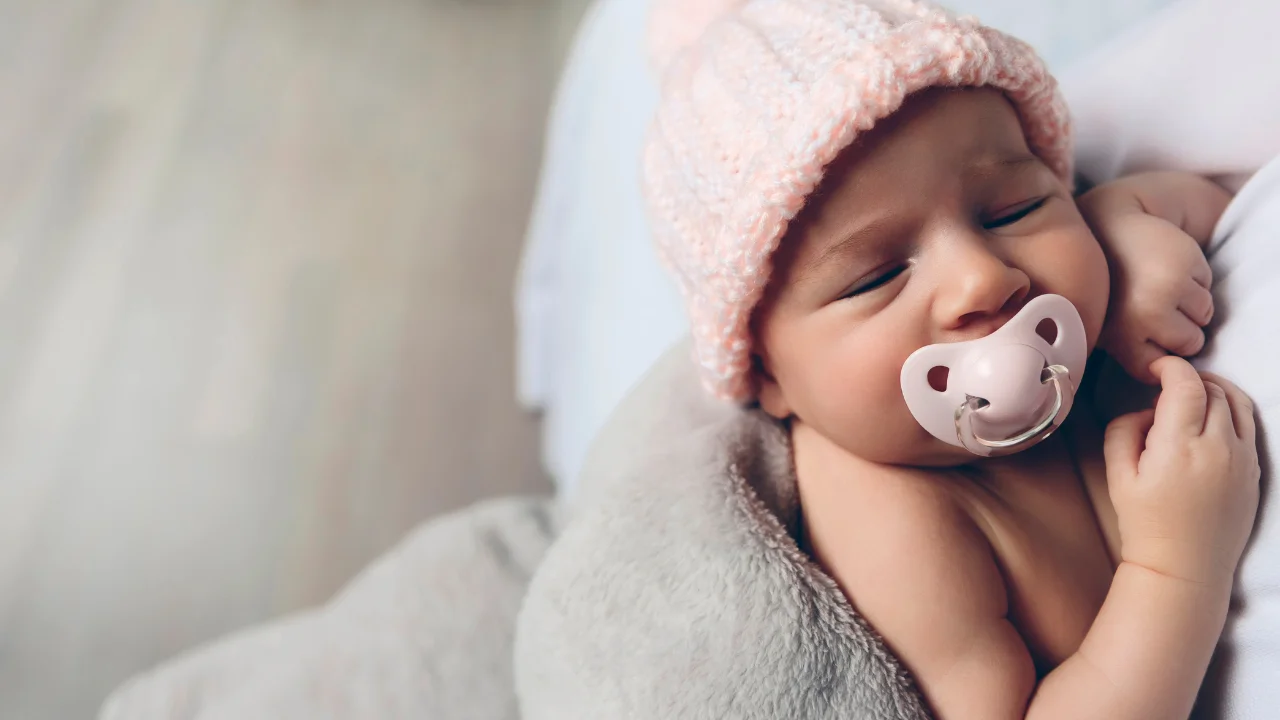
Newborns! It’s perfectly safe for babies to sleep with pacifiers. In fact, sleeping with a pacifier may even help reduce the risk of sudden infant death syndrome (SIDS).
For babies who find great comfort in sucking, pacifiers can be very useful. They can soothe a fussy baby and also help them fall asleep at bedtime.
Still, there are some important safety tips to remember when using a pacifier during sleep. Here’s what to know about pacifiers and safe sleep.
Can a newborn sleep with a pacifier?
Yes, newborns can sleep with pacifiers. The Pediatrics recommends that babies use pacifiers at nap time and night to reduce their risk of SIDS. If you’re breastfeeding, wait until that’s established – give it about 3 weeks – before giving your baby a pacifier.
If your little one will be sleeping with a pacifier, there are a few important safety tips to keep in mind:
- Don’t tie or clip the pacifier to your baby’s clothing or bedding.
- Only use one-piece pacifiers. This reduces the risk of a piece coming off the pacifier, which would be a choking hazard. Skip pacifiers that attach to strings, blankets, beads, or stuffed animals.
- Choose a pacifier with air holes in the shield (the part that rests on your baby’s lips).
- Choose a pacifier with a shield that’s at least 1.5 inches. As your child grows, get pacifiers in larger sizes so the whole pacifier never fits in their mouth.
- Replace pacifiers regularly, since they degrade over time. Some manufacturers include expiration dates on their pacifiers – if yours has one, follow it. If your pacifier doesn’t have an expiration date, check on its condition every once in a while. If the rubber is discolored or cracking, throw the pacifier away.
This doesn’t mean that all babies need to sleep with pacifiers. Your baby may just not like using a pacifier, or it may take some trial and error to find a binky they like. If your baby isn’t into pacifiers, offer one on occasion, but don’t force your baby to use it if they don’t want it.
Should you remove your baby’s pacifier while they’re sleeping?
There’s no need to remove your baby’s pacifier while they’re sleeping. In fact, doing that might wake them up, and we all know the old rule about never waking a sleeping baby.
If the pacifier comes out at night and your little one is sleep sleeping soundly, don’t feel like you have to put it back in.
Potential pacifier pitfalls
One of the drawbacks of letting your baby sleep with a pacifier is that they may become dependent on it to fall back asleep.
That means your baby might wake up during the night if they drop their pacifier and can’t put it back. If this happens, you may have to get up regularly at night to retrieve the binky (these are the moments when a glow-in-the-dark pacifier is worth every penny).
However, by 5 or 6 months, babies have the coordination to replace their own pacifier, as long as it didn’t fall out of the crib or out of reach.
Another potential pitfall: If your baby has a cold and can’t breathe through their nose, they’ll be more miserable if they depend on a pacifier for comfort.
Finally, there are some health concerns to be aware of. Babies who use a pacifier after 6 months are more likely to get middle ear infections, thrush (a yeast infection in the mouth), and intestinal infections.
If your baby is especially prone to these infections, talk to your pediatrician. They may recommend weaning off the pacifier to help reduce infections.
You may have heard that giving your baby a pacifier will lead to long-term dental problems, but that’s unlikely. During these early months and years, your child only has baby teeth; permanent teeth generally don’t appear until around age 6.
Mention to your child’s pediatrician or dentist that they use a pacifier, though, and they’ll watch for problems at each checkup just in case.
Read more about


Add a Comment